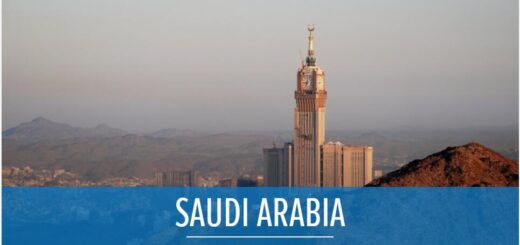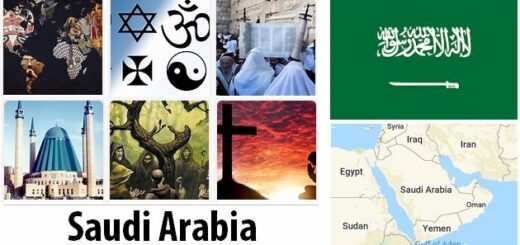State Structure and Political System of Saudi Arabia
Saudi Arabia is an absolute theocratic monarchy with a cabinet of ministers. Saudi Arabia is an Islamic state, the role of the Constitution of the country is performed by the Koran, which defines ethical values and gives instructions. In 1992, the Basic Nizam on Power was adopted – an act regulating the system of government. Check equzhou for political system of Saudi Arabia.
Administrative division of the country: 13 administrative regions (provinces, or emirates), within which 103 smaller territorial units have been allocated since 1994.
The largest cities: Riyadh, Jeddah (over 2 million people, with suburbs 3.2 million), Dammam (482 thousand people), Mecca (966 thousand people, with suburbs 1.33 million), Medina (608 thousand people) (2000 estimate).
Principles of public administration: the basis of the legislative system is Sharia – an Islamic code of laws based on the Koran and Sunnahs. The king and the council of ministers operate within the framework of Islamic law. Acts of state come into force by decrees of the king. In public administration, the principles of deliberation (shura), ensuring consensus, equality of all before the law, the source of which are Sharia norms, are applied.
The supreme body of legislative power is the king and the Advisory Council, appointed by the king for 4 years, consisting of 90 members from different strata of society. Council recommendations are submitted directly to the king.
The highest body of executive power is the Council of Ministers (appointed by the king). This body combines executive and legislative functions, develops proposals in the field of domestic and foreign policy.
The king is the head of state, the head of the highest body of legislative power, the head of the highest body of executive power. Check homeagerly for democracy and human rights of Saudi Arabia.
The composition of the Advisory Council and the Council of Ministers is appointed by the King. The Advisory Council has a chairman and is half renewed in composition for a new term. The question of the possible introduction of an elected representative body is currently being worked out.
King Abdelaziz ibn Saud, who fought for the unification of the kingdom for 31 years and managed to achieve this by establishing an independent state, which he ruled until 1953, is considered, first of all, King Abdelaziz ibn Saud. He made a great contribution to the formation of statehood. King Fahd ibn Abdelaziz ibn Saud played an important role in the successful implementation of programs for the economic modernization of the country and the use of its potential. Even before accession to the throne, he was the first Minister of Education of the country, developed a plan for reforms in education, during his reign he ensured the constant development of a long-term program of economic reforms and the rise of the authority of Saudi Arabia in the international arena. On November 24, King Fahd assumed the title of “Keeper of the Two Holy Mosques” (the mosques of Mecca and Medina).
In the administrative units of the country, power is exercised by the emir of the province, whose appointment is approved by the king, taking into account the opinion of the inhabitants. Under the emir, there is a council with an advisory vote, including the heads of government agencies in the region and at least 10 citizens. The administrative divisions within the provinces are also headed by emirs, who are responsible to the provincial emir.
There are no political parties in Saudi Arabia. Among the leading organizations of the business community are the Saudi Association of Chambers of Commerce and Industry in Riyadh (which unites the country’s major entrepreneurs), several dozens of chambers of commerce in the country. The Supreme Economic Council has recently been established with the participation of representatives of the state and business circles.
The activities of trade unions are not provided for by law. Among other public organizations, the structures involved in the dissemination of Islamic values are of great importance, primarily the League for the Promotion of Virtue and the Condemnation of Vice. There are more than 114 charitable organizations and more than 150 cooperatives operating in the country. The Saudi Red Crescent Organization has 139 branches throughout the country. Its activities are supported by the state. A system of cultural societies, literary and sports clubs, scout camps has been created. There are 30 sports federations. Clan, tribe, family are the traditional foundations of Saudi society. There are more than 100 tribes in the country, which in the recent past settled in cities in one quarter. They undergo certain changes under the influence of the modern way of life. A group of Muslim clerics and theologians is considered to be an influential social stratum. The strengthening of modern social strata continues: entrepreneurs, workers, intellectuals.
The domestic policy of Saudi Arabia is based on following the Islamic faith in all spheres of life, the government’s concern for stability in the country and the well-being of its citizens, the comprehensive development of the education system, social services, and healthcare.
Foreign policy includes the following principles: Islamic and Arab solidarity, the country’s desire to act from a peaceful position in resolving all regional and international conflicts, the active role of Saudi Arabia in international affairs, good neighborly relations with all countries, non-interference in the internal affairs of other countries.
The armed forces consist of the army and the National Guard. The paramilitaries include the forces of the Ministry of the Interior. In 1997, the armed forces of Saudi Arabia numbered 105.5 thousand people, incl. 70 thousand in the Ground Forces, 13.5 thousand in the Navy, 18 thousand in the Air Force and 4 thousand in the Air Defense Forces. The total strength of the National Guard was approx. 77 thousand people (1999). The Air Force (in 2003) has 294 combat aircraft, not counting transport aircraft, etc. The ground forces are equipped with French and American tanks (1055 units), armored personnel carriers, and Hawk missiles. The air defense troops are equipped with the Patriot, Krotal complexes, interceptor fighters. The fleet has several dozen large ships and boats for various purposes,
Saudi Arabia has diplomatic relations with the Russian Federation (established with the USSR in February 1926. In April 1938 diplomatic relations were frozen. Restored at the level of ambassadors in September 1990).


